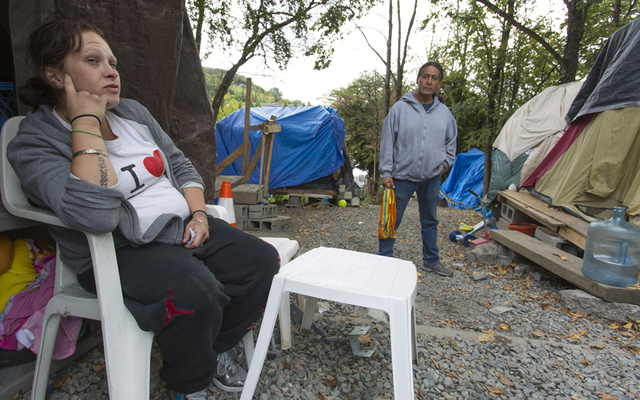Time in Seattle spurs ideas for homeless crisis

Three City Council members returned from Seattle on Friday with ideas on how to reduce Honolulu’s homeless population, including establishing a centralized “crisis solutions center” for mentally ill and addicted homeless people.
An idea to establish Seattle-like, government-sanctioned tent cities on Oahu gained traction last year after another set of Council members visited Seattle. That group included Chairman Ernie Martin, who wants to see the first tent city go up in his Central Oahu-North Shore district.
During a five-day trip last week, Council members Carol Fukunaga and Ann Kobayashi took a look at King County’s DESC Crisis Solutions Center, which they toured with Councilman Ron Menor. Menor could not be reached for comment Monday. DESC was founded in 1979, and the initials stand for Downtown Emergency Service Center. Seattle’s crisis center operation also includes a mobile crisis center.
“It’s a great concept,” Kobayashi said. “We want to do the same thing here.”
Fukunaga said that if the idea takes hold on Oahu, it could free up police and other first responders, along with costly hospital and emergency room treatment.
“You really divert a lot of time and energy away from the Police Department, the hospitals, emergency rooms and even the prisons,” Fukunaga said. “We were very impressed with what we saw.”
Don't miss out on what's happening!
Stay in touch with breaking news, as it happens, conveniently in your email inbox. It's FREE!
Following the earlier trip to Seattle, which included two other Council members, Seattle’s concept of so-called “hygiene centers” became closer to reality last week when Mayor Kirk Caldwell announced the city’s purchase of a four-story building in Iwilei that homeless people will use to take showers, wash their clothes and get social service help. They even will be able to live in studio apartments upstairs.
Councilman Joey Manahan, whose district includes Iwilei, went on the Seattle trip. He said he supports both the new hygiene center and the kind of tent cities he saw in Seattle that are made out of 120-square-foot “tiny houses” to comply with zoning laws.
In Seattle’s tent city, residents elect their own leaders and organize themselves into committees. They take turns on security watches.
While Fukunaga is intrigued with the idea of tent cities, she and Kobayashi were particularly impressed by the Crisis Solutions Center, which operates several satellites and one large center downtown.
Like everything related to homelessness, Fukunaga said, the location for an Oahu version of a crisis center would be critical.
Seattle’s 2011 opening of its Crisis Solutions Center was delayed by a court challenge from neighbors. But the neighbors lost the court fight, and the program restarted in 2012.
Oahu political leaders can learn from Seattle’s example by first talking to community members about the needs of their homeless population — and then implementing programs that make sense, Fukunaga said.
“We work with the neighbors and communities first. My sense is if the community is involved in identifying what’s most appropriate, you get a lot more community support and buy-in,” she said.
In Honolulu, Fukunaga said, “Our challenge is to demonstrate some positive successes with an initial project or two so the people in the surrounding neighborhood can see it’s really going to benefit the neighborhood as a whole.” During last week’s trip, she said, each of the three Council members “saw different kinds of applications of the various models that would be relevant in our own districts.”
7 responses to “Time in Seattle spurs ideas for homeless crisis”
Leave a Reply
You must be logged in to post a comment.





Yes, let’s send our homeless to gloomy Seattle.
great idea, we can pay them for each person sent.
Why is it our utterly clueless elected bureaucrats love to use the term “Crisis” to justify their asking for more money, more government workers, more wasteful, never ending government programs.
Bureaucrats need to understand the overall goal of the homeless program is to reduce the numbers, get people back to work and off the dole. We are not in the business of providing a lifetime of housing at taxpayer’s expense. Those capable, should also pay a small percentage of their costs.
But we’re always going to have homeless. Always. There will be some who need lifetime funding. Some homeless are too old/ill to ever work again. Some homeless are too mentally ill to ever work again. Etc. I have no problem with providing lifetime funding with my taxes. Better they be housed than left to rot on the sidewalk like I see in NYC. There’s also the issue, in this state, of even finding sufficient work for those who can get back to work. Jobs here can be poorly paid and we must all know some folks who work two, and even three jobs to make ends meet. Perhaps some kind of program could be set up to send people to the mainland, not to just send ’em and leave ’em, but send them where they will some kind of job waiting.
What a compassionate and understanding person you are among the many uncharitable critics. God bless you.
Politicians love taking junkets but what expertise do they have? Would it not be better to send people with experience and judgment – who deal with the homeless directly – to accurately assess the various programs/solutions being implemented elsewhere?
The question would be to the council members who wish to place tax payer monies in to this idea for persons who do nothing and will continue to do nothing for themselves is “Did they ask the Homeless increased in Seattle with this program.” I am sure the number increased when government gives away more free subsidies? The number has increased and will increase more in Hawaii if this is created. Law makers do things that appear to be politically correct and do not think of the consequences.